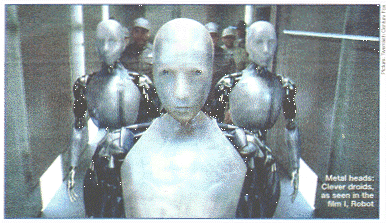ARTIFICIAL INTELLIGENCE IS STEPPING OUT OF THE LABORATORY INTO YOUR
LIVING ROOM SAYS MARK HARRIS

You might not have realised it from the TV schedules but 2005 was
the cleverest year ever. From sophisticated toys to top techno gadgets,
artificial intelligence
ruled the roost - and the future for smart machines is looking brighter
still.
Hailed by Time magazine as one of the hottest gadgets of the year and by
eBay as its most wanted Christmas gift,
the Robosapien V2 is leading the craze for brainy, bionic buddies. It stands
more than 60cm high,boasts14 powerful motors and is brawny enough to lift
a beer can.
But the Robosapien V2's real strengths are intellectual, says its creator
Mark Tilden. 'Robosapien V2 is definitely aware. He'll pay attention to you,
he responds directionally to sound, to sight and to colour.'
The humanoid robot isn't just another remote-controlled cyborg - he has a
personality of his own, taking, walking, dancing and even farting. According
to ex-Nasa scientist Tilden. 'You can actually train Robosapien V2. You just
pick him up, show him what you want him to do and he remembers.'
Sci-Fi?
Artificial intelligence (AI) has been
a favourite subject of science-fiction ever since
Alan Turing, the
scientist who designed
Britain's
code-breaking computers during World War II,came up with a test for AI
in 1950. The Turing Test was developed to answer the question of whether
or not machines have achieved intelligence.
While there's no mistaking the Robosapien V2 for a real person, AI technology
is already matching- and even out-performing -humans in some areas.
Chess
grandmaster
Garry
Kasparov famously lost to the Deep Blue computer back in l997and all
but the most basic software can now defeat most master-level players. AI
software is also used in business, medicine and, especially, the military.
The US government estimates that the savings generated by using AI software
to deploy military resources easily outweighs its annual £ll3 million
AI research bill.
The latest AI triumph was in the Darpa Grand Challenge, a gruelling
off-road rally through the Mojave Desert. A driverless Volkswagen Touareg
RS, controlled by seven Pentium M computers, navigated the 210km course in
under seven hours - and earned its designers from Stanford University £l
million in prize money.
So where is it all heading? Some scientists are looking forward to
'the
singularity': the moment when we create an artificial mind more powerful
than our own. This could then create a smarter AI still, starting a snowball
effect resulting in massive technological advances over a short space of
time. Peter Thiel, the former CEO of online payment service PayPal, recently
pledged to match £56,500 ($100,000) in donations to fund work
towards achieving the singularity in the next few years.
At heart...
But there are some who doubt the super intelligent
AIs will have humans' best interest at heart. Even if they don't cause a
nuclear holocaust, as in the Terminator films, AIs may not be happy using
their processing power looking after dumb, old people. The prolific science
fiction writer
Isaac
Asimov once famously demanded that all intelligent machines should be
designed around three
laws to make it impossible for them to harm people.
Today's AIs are limited to choosing routes in OPS navigators, helping users
understand Microsoft's software or controlling the first basic domestic robots.
They may be small and reliant on battery charges now but Tilden has big plans
for them.
'The original Robosapien was only able to annoy your cat but V3 [due in 2007]
will be capable of doing practical tasks around the home,' he says. 'My
latest prototype is 5ft 5in and can walk as fast as you.' So treat
today's robots well - when the singularity comes, they'll remember who changed
their oil.
atmetro@ukmetro.co.uk [Metro 11
Jan,2006]
|
